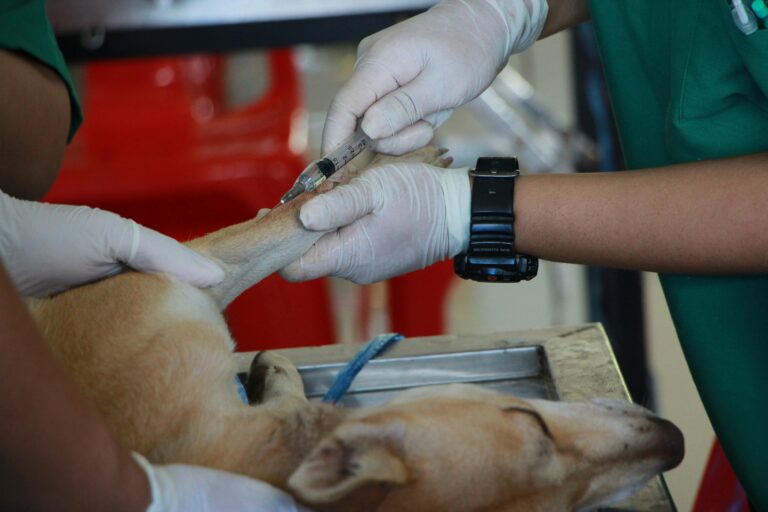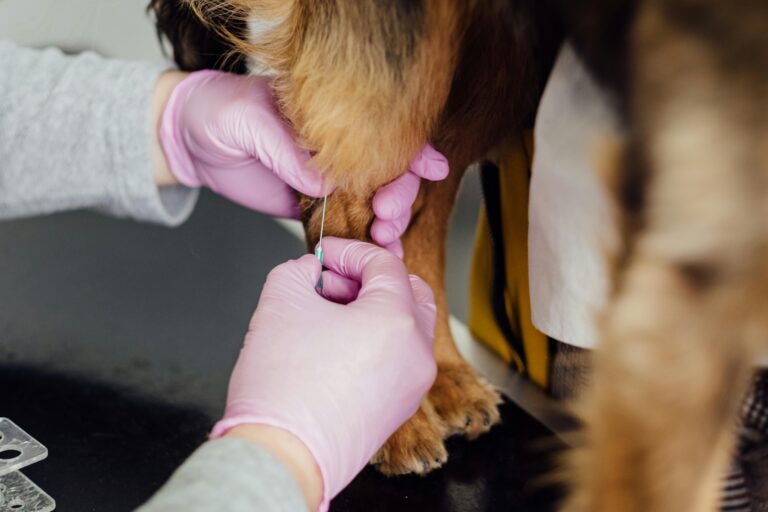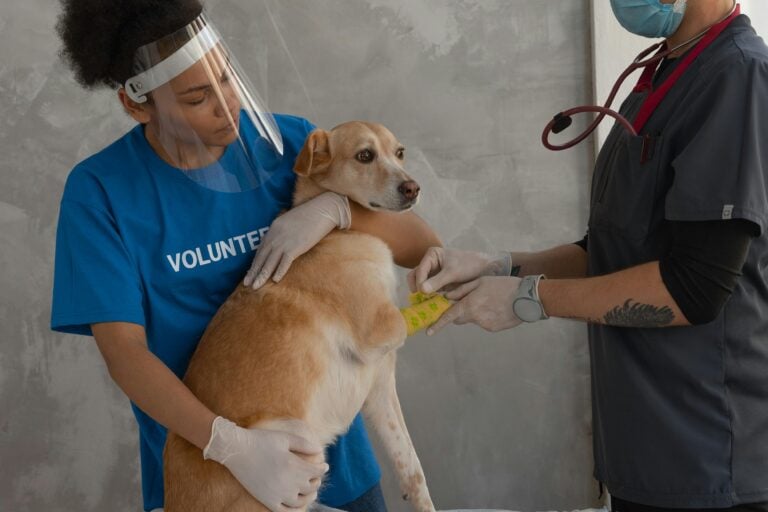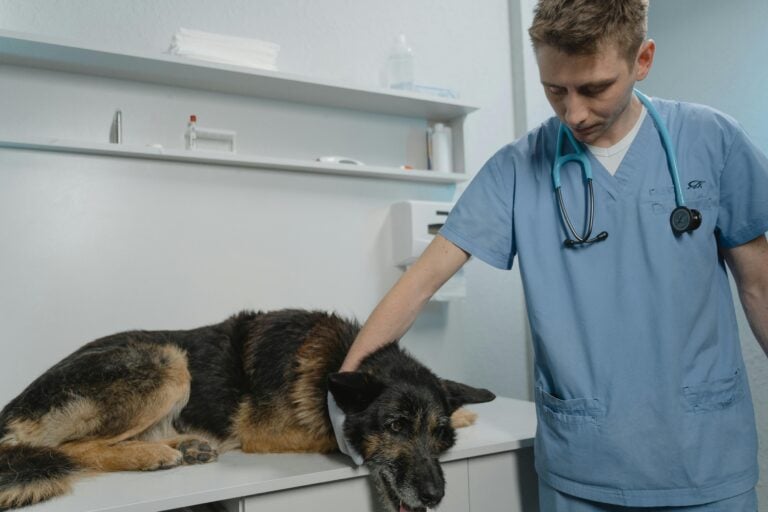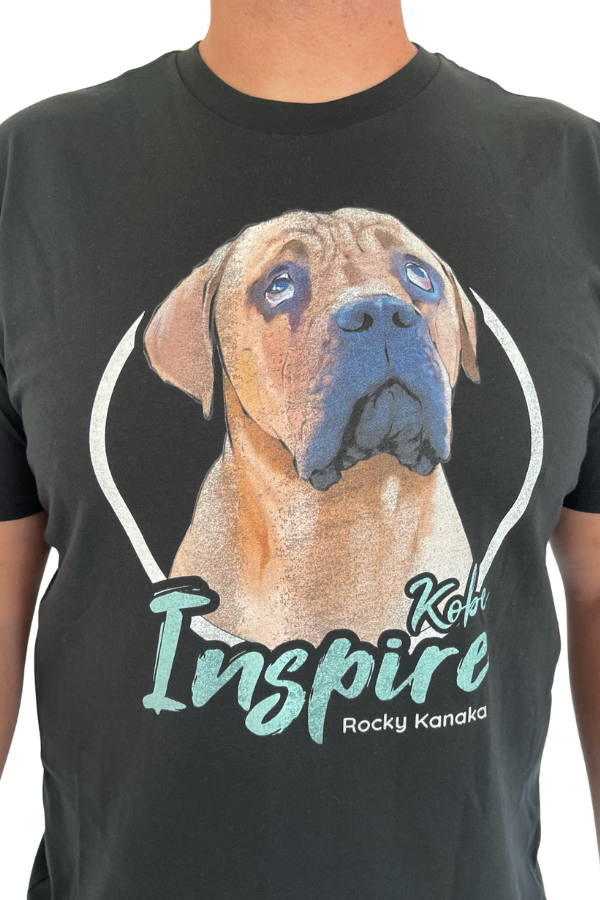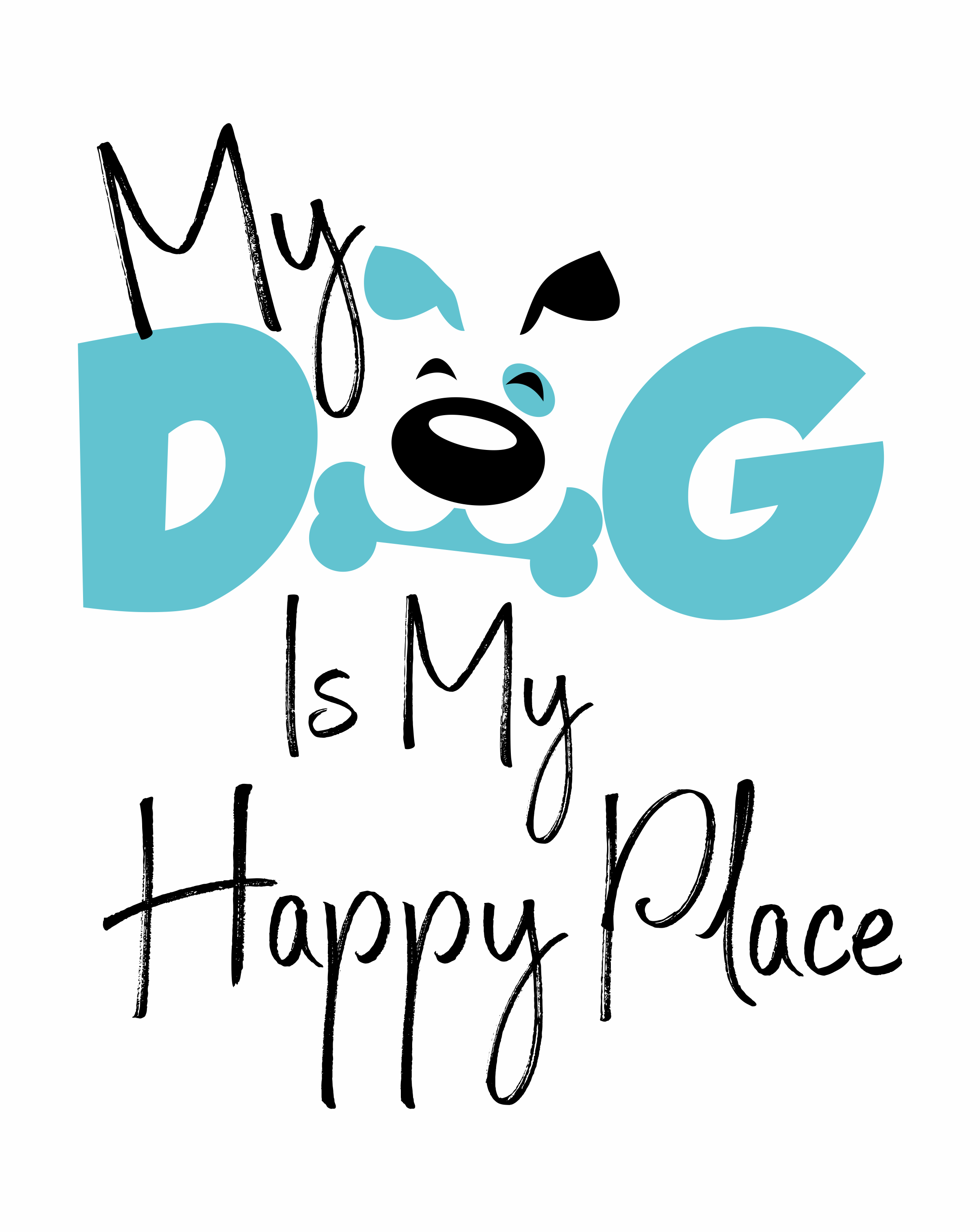Dachshund Puppy Develops Serious Vaccine Reaction Minutes After Getting Booster Shots
One of the most crucial aspects of responsible dog ownership is ensuring your furry friend is up-to-date with vaccinations. Vaccines, as we all know, play a major role in protecting dogs from potentially fatal diseases as well as ensuring they don’t contract and spread any contagious illnesses to other pets (and humans).
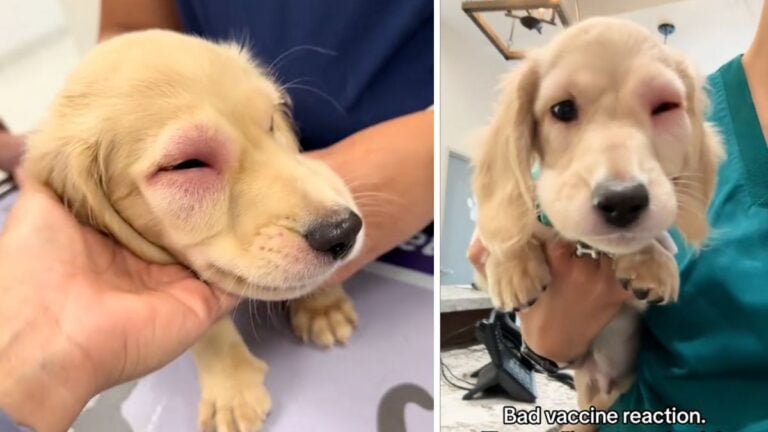
Unfortunately, vaccinating your dog sometimes comes with an added risk: allergic reactions. It’s a risk that one Dachshund puppy owner on TikTok — who works in a vet clinic and often brings along her puppy to work — knows too well. As explained in a TikTok video shared by the owner on account @alli_zan, her Dachshund developed an adverse reaction just ten minutes after getting his booster shots. (watch TikTok below)
“A few weeks ago, the pup was getting his booster shots. After about ten minutes, someone noticed he was acting weird in his kennel. He was rolling around frantically and rubbing his face on his towel. Within the next several minutes, his eyes and muzzle began to swell up, and he got hives all over his belly. He was having a vaccine reaction. Best place to be when this was happening was my place of work, close to veterinarians,” reads part of the video’s caption.
Luckily, the lovely Doxie received a couple of injections to reverse the allergic reaction. He recovered fully and is now healthier than ever.
Watch the video below:
@alli_zan A few weeks ago the pup was getting his boosters. After about 10 minutes someone noticed he was acting weird in his kennel. He was rolling around frantically and rubbing his face on his towel. Within the next several minutes his eyes and muzzle began to swell up and he got hives all over his belly. He was having a vaccine reaction. Best place to be when this was happening was my place of work, close to veterinarians. I love my doctors so much! We gave him a couple of injections and he was still pretty swollen as the next few hours went by. He's living his best happy healthy puppy life and will get pre-med before any vaccines in the future 🥰💜 #dachshundsoftiktok #dachshund #VetTech #vaccinereaction #signsofvaccinereactions ♬ Sparks – Coldplay
Vaccine Reaction in Dogs: Everything You Need to Know
Keeping up with your dog’s vaccination schedule is one of the best things you can do to help them live a longer, healthier life. Vaccines work by stimulating your dog’s immune system to detect and fight specific disease-causing pathogens before they wreak havoc.
Among the core vaccinations that puppies and adult dogs should receive include rabies, canine distemper, canine parvovirus, and infectious canine hepatitis. On the other hand, some of the non-core vaccinations for dogs include Bordetella, Canine Influenza, Lyme disease, and Leptospirosis vaccines.
Similar to humans, it’s not unusual for dogs to experience an allergic reaction after getting vaccinated. According to a study carried out by the American Veterinary Medical Association, dogs with smaller bodies are at a higher risk of vaccine reactions compared to larger breeds. In addition, this study found that the more vaccines a dog receives in a single vet visit, the higher their chances of an allergic reaction.
Common Symptoms of Vaccine Reaction in Dogs
Since vaccination triggers an immune response, some dogs may develop mild and short-lived symptoms after getting vaccinated. Among the common symptoms associated with mild allergic reaction in dogs from vaccines include:
- Runny nose, sneezing/cold-like symptoms
- Small, firm bump at the site of vaccination
- Mild fever
- Reduced appetite
- Lethargy
According to pet health experts at Veterinary Partner, some dogs recover within a day without needing veterinary intervention. In other cases, a vet may prescribe medications such as anti-histamines to help your dog recover from these symptoms.
Though rare, some dogs can develop an adverse reaction to vaccination. These severe allergic side effects — better described as anaphylaxis — can be life-threatening and, therefore, require immediate veterinary attention. They include:
- Facial swelling
- Persistent vomiting and diarrhea
- Hives and itchiness
- Difficulty breathing
- Collapse
Nonetheless, it’s advisable to alert your vet if your dog is showing signs of an allergic reaction to a vaccine, whether the symptoms are mild or severe.
“Our beloved Bandit died yesterday from a reaction to his last vaccinations. He started vomiting, and we took him to the emergency vet and they treated him. We took him home and put him in his crate for the night but when we got up found he died during the night. We cannot believe this happened. One minute he was a happy, lively puppy, and the next day he is gone,” shared heartbroken user @Ohwhatagoose on Reddit four months ago.
@vethernarian My dog had a serious vaccine reaction today. Probably the most serious I have seen in any pet. Have your pets had vaccine reactions? #veterinarian #vet #vetmed #petlover ♬ original sound – vetHERnarian
Rabies Vaccine Reaction in Dogs
Rabies is a contagious disease said to have a 99% fatality rate. This disease often affects the brain, spinal cord, and nervous system of an animal, which is why it’s important to ensure your dog receives rabies vaccination and subsequent booster shots.
Similar to other dog vaccines, rabies vaccine can result in mild or serious side effects in some dogs.
“My dog was vaccinated for rabies…she had a terrible reaction and went into anaphylactic shock. Respiratory distress, she collapsed, her gums went white, vomiting and diarrhea. They gave her epinephrine, oxygen, some steroids. It took her a few days to get back to normal,” revealed user @vinovida237 in a Reddit discussion on reaction to rabies vaccine in dogs.
Delayed Reaction to Rabies Vaccine in Dogs
In some cases, a dog may start showing side effects several days after receiving their rabies vaccine.
“Bump/lump on rabies vaccination site, showed up a week after. No pain or irregularities with my dog. Vet said to wait for 2 mos and watch for changes,” shared user @Ibasc410 alongside a photo of their dog in a Reddit post on vaccine reactions.
Reaction to Distemper Vaccine in Dogs
Canine Distemper is a highly contagious viral disease that affects dogs and other animals. This potentially fatal disease mostly attacks a dog’s nervous system, gastrointestinal tract, and respiratory organs. Since unvaccinated dogs are at a greater risk of contracting this disease, it’s essential for your dog to get their distemper vaccine and other follow-up booster shots.
While some dogs may seem pretty fine after getting vaccinated against distemper, others may develop mild or adverse reactions to the vaccine.
“My 7-year-old Shih Tzu mix received two vaccines yesterday. A Lyme booster and a distemper shot. This morning she is lethargic, lack of appetite, and shaky,” wrote user @shaunarage33 in a Reddit post on distemper vaccine reaction in dogs.
Reaction to Bordetella Vaccine in Dogs
Also referred to as Kennel Cough, Bordetella is a contagious bacterial disease that mostly affects a dog’s respiratory system. The most effective way to protect your dog from this disease is to ensure they receive their Bordetella vaccination and booster shots.
Bordetella vaccine isn’t a core vaccine, meaning not every dog needs it. According to the American Kennel Club, this vaccine is mostly recommended for dogs that frequent social settings such as doggy daycares, dog parks, dog shows, boarding kennels, and training classes.
Not all dogs develop side effects after getting vaccinated against Bordetella. For those that do, though, their reaction to the Bordetella vaccine may be severe or mild. In other words, this reaction varies from dog to dog.
“Our little guy had an allergic reaction to the Bordetella vaccine. We got his shots done, left for an hour and a half, and came back to a swollen face. I was so scared, but we took him to the vet, and some Benadryl seemed to do the trick. He wasn’t having any trouble breathing, thank goodness,” shared user @Hot-Reputation-9573 in a Reddit post on Bordetella vaccine reaction in dogs.
Leptospirosis Vaccine Reaction in Dogs
Canine Leptospirosis is a serious bacterial disease that mostly damages a dog’s kidney, liver, and blood vessels. Since leptospira bacteria often hide in urine-contaminated soil and water, unvaccinated dogs who get into contact with contaminated soil or water are more likely to contract Leptospirosis.
As with any other canine disease, Leptospirosis is fully preventable through vaccination. Unfortunately, some dogs may experience an allergic reaction after receiving the Leptospirosis vaccine.
“My 14-week-old Golden Retriever got the puppy boosters with a leptospirosis vaccine. As soon as I left the vet clinic, Chloe went to the patch grass outside and started vomiting. The vet took her inside and gave her fluids /Benadryl…..anyone else experienced this?” asked user @bluepenguine1393 in a Reddit post on lepto vaccine reactions in dogs.
Vaccine Reaction in Dogs FAQs
Treatment for vaccine reaction in dogs
Treatment for vaccine reactions in dogs depends on how mild or severe the symptoms are. Your dog may only need medication such as antihistamines or, in serious cases, medication plus oxygen, IV fluids, and other treatment options.
Parvo Vaccine Reactions in Dogs
The symptoms can be mild (like a runny nose, reduced appetite, and a small bump at the injection site) or serious (for example, facial swelling, hives, collapse, vomiting, and diarrhea).


